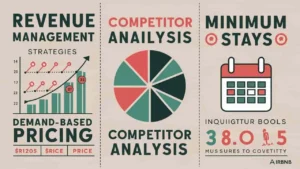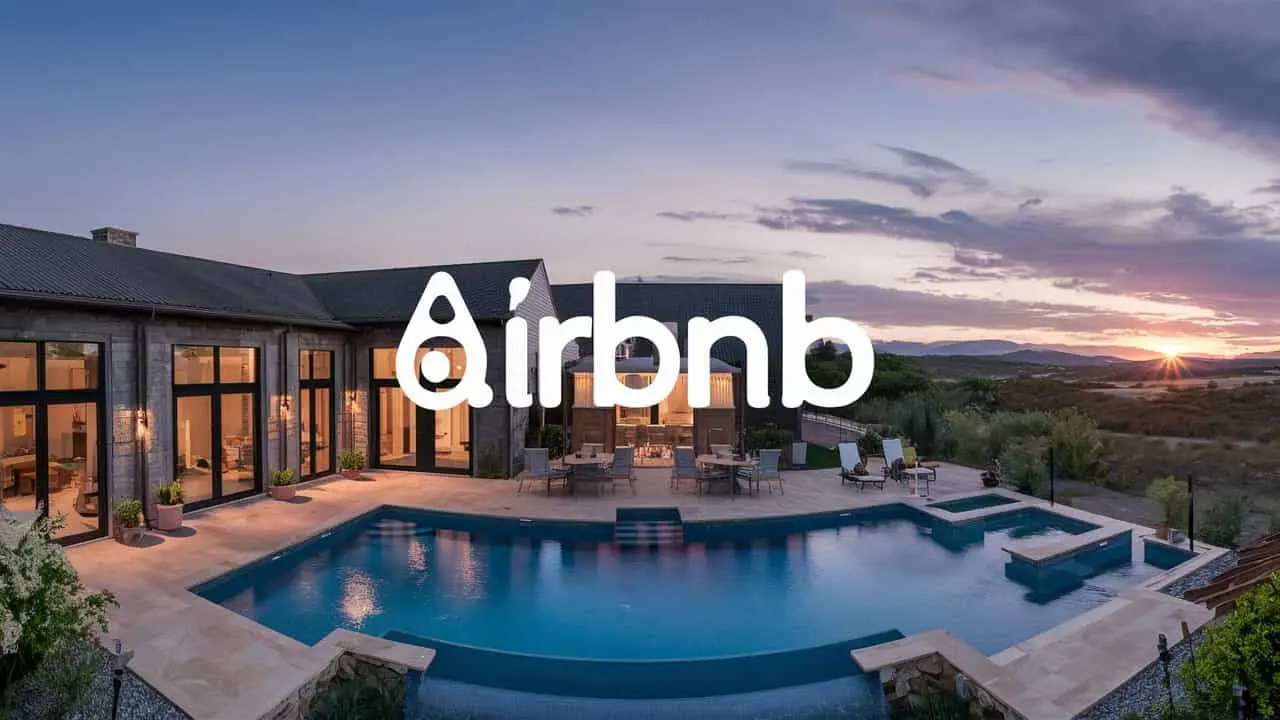Introduction
Ever wondered how successful Airbnb hosts consistently rake in the dough? The secret weapon in their arsenal is Airbnb revenue management. It’s not just about setting a price and hoping for the best. It’s a strategic approach to optimizing your listing for maximum profitability.
Demystifying Revenue Management
In essence, revenue management is the art of optimizing your Airbnb listing for maximum profitability. It’s like conducting an orchestra of factors—market trends, competitor pricing, local events, and guest preferences—to create a harmonious symphony that maximizes your income.
Why a Revenue Manager Matters (Even With Automation)
While tools can automate price adjustments based on set parameters, a skilled revenue manager brings a human touch to the equation. Here’s why a human element remains crucial:
- Strategic Thinking: Revenue managers can analyze complex data and identify trends beyond what basic algorithms can capture. They consider upcoming events, local festivals, and potential disruptions that might impact demand.
- Customization and Flexibility: Automated tools often follow preset rules. A revenue manager can adjust pricing strategies based on specific property features, unique amenities, or even targeting a particular guest demographic.
- Guest Psychology: Understanding how guests search and book is key. Revenue managers can tailor pricing strategies to capitalize on guest psychology, such as offering last-minute discounts or weekend promotions.
Unlocking Airbnb Revenue Management Success
Think of Airbnb revenue management as the conductor of your rental income orchestra. It considers various elements—market trends, competitor pricing, local events, and guest preferences—to harmonize them into a profit-boosting strategy.
Here’s a breakdown of the key factors to consider:
- Demand-Based Pricing: Don’t be afraid to adjust your rates based on seasonality, holidays, and local events. Popular weekends deserve a premium, while weekdays during off-seasons might benefit from discounts.
- Competitor Analysis: Research what similar rentals in your area are charging. Price yourself competitively to attract bookings without sacrificing your profit margin.
- Minimum Stays: Consider setting minimum stays during peak seasons to maximize revenue and reduce guest turnover.
- Length of Lead Time: Understanding how far in advance guests typically book for your location allows you to adjust pricing strategies accordingly.
Boost Your Bookings and Revenue with Actionable Tips
Now that you understand the core principles, let’s get tactical:
- Leverage Airbnb’s Smart Pricing Tool: This built-in feature uses data to suggest price adjustments based on market conditions.
- Offer Last-Minute Discounts: Fill those unexpected vacancies with strategic discounts for short-notice bookings.
- Package Deals: Entice guests with bundled offerings that include experiences or local activities.
- Optimize Your Listing: High-quality photos, a detailed description, and glowing guest reviews are essential for attracting bookings.
Three Airbnb Revenue Management Strategies to Employ Now

Now that you understand the power of revenue management, let’s explore some actionable strategies.
-
Demand-Based Pricing: Don’t be afraid to adjust your rates based on seasonality, holidays, and local events. Popular weekends deserve a premium, while weekdays during off-seasons might benefit from strategic discounts. Analyze past booking trends and competitor pricing to set optimal rates for different periods.
-
Competitor Analysis: Research similar rentals in your area and what they’re charging. Price yourself competitively to attract bookings without sacrificing your profit margin. However, don’t simply undercut your competition. Highlight your unique selling points and consider offering value-added services to justify a slightly higher price tag.
-
Minimum Stays: Consider setting minimum stays during peak seasons to maximize revenue and reduce guest turnover. This is particularly effective for high-demand properties. However, be mindful of guest expectations during off-seasons and adjust minimum stays accordingly.
The Art of Customization: DPGO Pricing Strategies
DPGO Pricing, a revenue management approach, goes beyond basic adjustments. It considers four key factors:
- Demand: Analyze market trends and adjust prices based on predicted booking volume.
- Price: Set competitive prices that consider both market value and your profit goals.
- Guest: Tailor pricing strategies to attract your target guest demographic.
- Occupancy: Set minimum stays and adjust pricing to achieve desired occupancy rates.
The Unsung Hero: The Power of Data in Revenue Management
Data is the fuel that drives effective revenue management. Here’s how leveraging data can elevate your Airbnb game:
- Identify Booking Patterns: Analyze historical data to understand peak seasons, popular booking windows, and guest preferences.
- Track Competitor Activity: Monitor your competitor’s pricing strategies to stay ahead of the curve.
- Measure Performance: Use data to assess the effectiveness of your pricing strategies and make adjustments as needed.
The Pros and Cons of Revenue Management Tools
While you can implement a basic revenue management strategy yourself, there are specialized tools available to streamline the process.
Pros:
- Automated pricing adjustments
- Market data and competitor analysis
- Dynamic minimum stay rules
- It saves time and effort
Cons:
- Can be expensive
- May require a learning curve
- Less control over pricing decisions
The Bottom Line: Is Revenue Management Right for You?
If you’re serious about maximizing your Airbnb income, revenue management is a worthwhile investment. Whether you choose a DIY approach or utilize dedicated tools, it empowers you to make data-driven decisions that boost your bookings and keep your rental cash flowing.
FAQs on Airbnb Revenue Management: Mastering the Art of Profitability
Building on the foundation of our previous blog posts, let’s address some frequently asked questions (FAQs) to solidify your understanding of Airbnb revenue management:
Is revenue management difficult to implement?
Revenue management can be learned, but there’s definitely a learning curve. For beginners, starting with basic strategies like demand-based pricing and competitor analysis is a good approach.
Resources:
- Airbnb’s Help Center on Setting Your Price: https://www.airbnb.com/help/article/474
How much can I increase my revenue with revenue management?
Studies by Beyond Pricing https://www.beyondpricing.com/promo-lp suggest that effective revenue management strategies can lead to increases of 20% or more in rental income.
Can I manage my Airbnb listing without revenue management?
Absolutely! However, by implementing even basic revenue management techniques, you might be leaving significant income on the table.
What are the benefits of using a revenue management tool?
- Automation: Tools can automate price adjustments based on set parameters, saving you time and effort.
- Market Insights: Some tools provide valuable data and competitor analysis to inform your pricing decisions.
- Dynamic Pricing: Advanced tools offer features like dynamic minimum stay rules, allowing you to optimize occupancy.
Resources:
- Here’s a https://www.airbnb.com/help/article/1168 comparison chart by Airbnb to help you choose the right tool for your needs.
What are the drawbacks of using a revenue management tool?
- Cost: Subscription fees for advanced tools can add up.
- Learning Curve: Some tools can be complex to learn and navigate.
- Less Control: You might relinquish some control over your pricing decisions with fully automated tools.
How can I find the right balance between automation and manual control?
Start with a tool that offers basic automation for repetitive tasks like price adjustments based on seasonality. As you gain confidence, explore more advanced features, but always maintain some oversight and be prepared to make manual adjustments when necessary.
What if my rental property is unique and doesn’t fit a typical mold?
Revenue management isn’t a one-size-fits-all strategy. For unique properties, leverage the customization features of some tools or focus on manual adjustments based on your understanding of your target guest and their booking behavior.
Where can I learn more about Airbnb revenue management best practices?
- Airbnb offers a wealth of resources in their Help Center, including articles on https://www.airbnb.com/help/article/474 and https://hello.pricelabs.co/airbnb-hosting-tips/.
- Beyond Pricing (https://www.beyondpricing.com/promo-lp) is a website dedicated to revenue management education, with valuable insights applicable to Airbnb rentals.
By understanding these FAQs and leveraging the provided resources, you’re well on your way to becoming an Airbnb revenue management pro! Remember, data is your friend. Analyze, adapt, and optimize your strategies to unlock the full earning potential of your rental property.
Conclusion
By mastering Airbnb revenue management, you transform your listing from a simple accommodation into a profit-generating machine. Think of it as wielding a conductor’s baton, expertly orchestrating a symphony of factors that influence your bottom line. With a data-driven approach, you can harmonize elements like seasonality, competitor pricing, and guest preferences to create a revenue-rich melody. As you become a revenue management maestro, you’ll not only fill your calendar with bookings but also ensure your rental income keeps hitting the high notes
Other Article
The Ultimate 15-Minute Business Plan Guide with help of AI
Starting a PMU Business: Key Steps to Launching Successfully


[…] Airbnb Revenue Management: Maximize Your Rental Income […]
[…] on listing platforms like Airbnb, Vrbo, Booking.com, or a combination to reach your target audience. Consider factors like platform […]
[…] your cabin on popular rental platforms like Airbnb, VRBO, and Booking.com. Optimize your listings with clear descriptions, highlighting amenities, […]
Undeniably believe that which you said. Your favorite justification appeared to be on the net the simplest thing to be aware of. I say to you, I certainly get irked while people think about worries that they plainly do not know about. You managed to hit the nail upon the top and defined out the whole thing without having side-effects , people can take a signal. Will probably be back to get more. Thanks